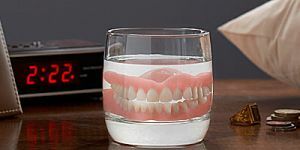 A prosthesis is an individually made artificial tooth that is held on the artificial jaw( lower) or lamellar copy of the palate and gums( upper).It is up to the doctor to decide what type of denture is needed in any given situation, removable or non-removable.
A prosthesis is an individually made artificial tooth that is held on the artificial jaw( lower) or lamellar copy of the palate and gums( upper).It is up to the doctor to decide what type of denture is needed in any given situation, removable or non-removable.
Wearing a removable design ensures that the problems of the dentition are hidden and a beautiful smile for many years, but with proper storage and care.
How to properly store dentures, depending on the material, do you need to remove them at night, how to clean during the day and throughout the life of the product? Knowing the answers to these questions will help prolong the life of the product and preserve its aesthetic appearance.
Contents of
- About modern materials in removable prosthetics
- What threatens indifference?
- Care and storage - it's worth knowing!
- So to shoot or not to shoot - a question or not a question?
- Experienced users advise
On modern materials in removable prosthetics
Modern prosthesis technologies allow the production of several types of removable prostheses using various materials:
- The clasp is the basis in the form of a metal arch( clasp), on which plastic gums and teeth from ceramics are attached. The design can be installed if there are natural teeth or an implant can be installed. This type of prosthesis is recommended in the absence of one or two adjacent teeth, it is attached by hooks or locks to healthy teeth. For hygienic procedures, the prosthesis is removed. The period of their operation is more than 5 years.
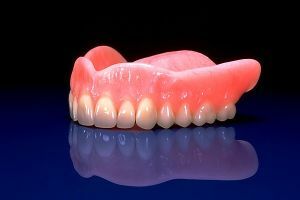
- Plate is an obsolete way to quickly solve the issue of aesthetics of appearance. This option is suggested in the case of the absence of several adjacent teeth. Plate made of soft plastic( acrylic) with teeth placed on it is very inconvenient to wear, but has a low cost.
- Flexible( soft) prostheses are distinguished by aesthetic appearance, comfortable wearing and democratic price. This option is recommended in the absence of three or more teeth, up to the absence of the entire dentition, in the presence of chronic periodontitis, adentia, bone tissue atrophy. The service life is about 5 years.
Prostheses are made from different materials, which requires a different approach to care and storage.
What does indifference threaten?
For many people who have lost teeth, prostheses are the only salvage, but they are also a favorable environment for the reproduction of bacteria.
Artificial teeth will please their owners in the event that they are provided with proper care and storage. Remains of food in the cavity between the construction and gums, teeth are threatened with very unpleasant consequences:
- smell;
- inflammation of the gums, turning into periodontitis;
- caries of natural teeth due to the formation of plaque on them;
- development of stomatitis, it is also possible the appearance of small ulcers on the mucous membrane of the oral cavity;
- change in taste sensations;
- tarnishing the design, changing the color of the mind to smoking and drinking tea and coffee, the loss of shine of the metal basis.
As a result of negligent care, prostheses will lose their aesthetic appearance and can pose a serious threat to health in general.
The designs of acrylic have the most favorable surface for the reproduction of bacteria, soft prostheses are the safest in this respect. Polyurethane occupy an intermediate, in all respects, position between acrylic and nylon.
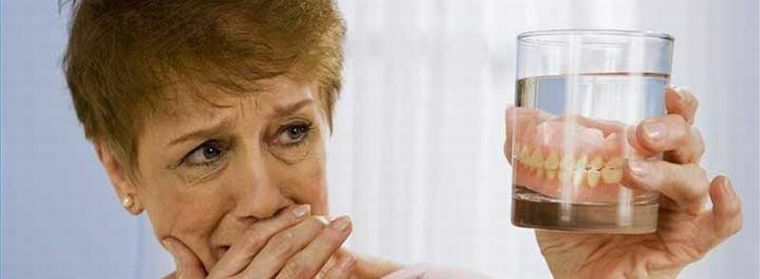
Care and storage - it's worth knowing!
The duration of operation of dentures, as well as the safety of their use depends on the quality of oral hygiene, care and proper storage in case they are removed at night.
General care rules are not complex. It is recommended to clean dentures from any material after each meal, it is enough to remove it and rinse it with chilled boiled water( it is not recommended to use tap water because it contains chlorine and various other negative artificial impurities).
Plastic and acrylic dentures must be cleaned at least once a day with a soft toothbrush( preferably a special toothbrush) and a delicate toothpaste. Efforts to apply is not recommended, because you can change the shape of the frame, bending it, or damage the plastic surface.
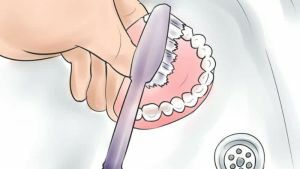 After cleaning, it is necessary to withstand the false teeth in a special antiseptic solution, which can be purchased at the pharmacy ready or in the form of tablets and prepare it yourself. At this stage, the bacteria and particles of the cream, gel or glue are destroyed, which help fix the artificial teeth.
After cleaning, it is necessary to withstand the false teeth in a special antiseptic solution, which can be purchased at the pharmacy ready or in the form of tablets and prepare it yourself. At this stage, the bacteria and particles of the cream, gel or glue are destroyed, which help fix the artificial teeth.
Acrylic dentures can and should be removed for the whole night and stored in such a solution for disinfection, but nylon enough to withstand a solution of half an hour - an hour.
As a result of prolonged wearing and poor quality cleaning on artificial teeth, plaque may form. It is possible to get rid of it only in conditions of a professional workshop. For the prevention of prosthesis should be subjected to professional cleaning every six months.
The products are stored in special containers for storage. If you need to store a long time, you should pour a washing solution into the container( you can buy it in the pharmacy) or chilled boiled water.
For the care of artificial teeth, it is recommended to purchase special products from proven manufacturers( for example, Corega or Lacalut)
To clean clasp dentures it is better to use a special toothbrush, the shape of which will allow cleaning the most difficult places under the arc.
It is better not to clean the arc from several areas mechanically, as the metal can darken. Remove and clean such products should be after each meal.
But for the night clasp dentures can not be removed, but it is useful to purchase a special container with ultrasonic cleaning in which it is stored in the form of a complex design and a long service life. If you use this method of night cleaning, then disinfection in a special solution can not be carried out.
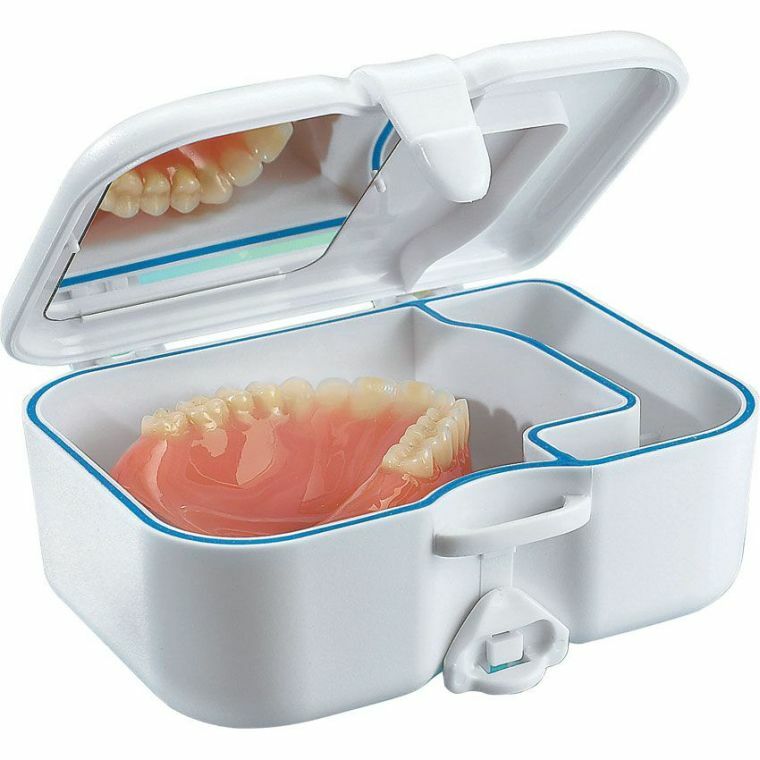
Container for storage of prosthetic devices
So to shoot or not to shoot - a question or not a question?
Removable products are usually located on the gingival surface of the jaw, which sometimes creates areas that remain without natural self-cleaning saliva. Therefore, these designs need thorough cleaning, at least once a day( for this, the prosthesis needs to be removed at night and placed in a special solution), but the best option is to clean after each meal.
Is it worth it to take a prosthesis for the night, if its cleaning after the evening meal has already been carried out? This decision is made by its owner.
Doctors recommend that in the period of adaptation to artificial teeth leave them at night in the mouth. But this may not be safe for life: it is likely that during sleep there will be a desire to get rid of the foreign body in the mouth, the type of which the prosthesis can block the airways and cause strangulation.
An allergic reaction of varying degrees can cause acryl: from a slight inflammation of the gums to the appearance of serious wounds on the mucous membrane of the mouth. Being constantly in the mouth in contact with saliva acrylic releases harmful to health organic compounds( monomers).
An unpleasant aftertaste, discomfort and changes in taste sensations can cause an alloy of metal, which is used as the basis of the prosthesis.
Neutral nickel alloys are used in the designs, but during the socks the metal will be oxidized and this can cause 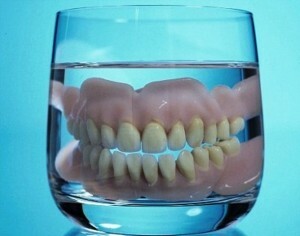 allergies in the form of burning and edema of the palate, gums and tongue. But the affordable price makes this alloy one of the most popular in orders. Chromium alloys are more hygienic, but their cost is higher.
allergies in the form of burning and edema of the palate, gums and tongue. But the affordable price makes this alloy one of the most popular in orders. Chromium alloys are more hygienic, but their cost is higher.
Even with them, a local allergy is likely, as on other elements of the alloy: beryllium, molybdenum and others.
Due to the presence of metal in the construction of an acrylic prosthesis, it is not recommended to store it in ordinary tap water: the metal will darken, its oxidation will be accelerated and the service life will be shortened.
Experienced users advise
We have collected interesting, in our opinion, practical advice on cleaning and storing prostheses, from visitors to our site.
The dentist advised to purchase a special brush for cleaning prostheses. But the neighbor advised that you can buy a regular dentist for young children - they are the softest. Toothpaste I also buy a baby toothpaste - for the little ones. Now there is no problem with cleaning.
Oleg
I saw how my grandmother keeps her jaw. It's time now to take care of the dentures. Decided to do as a grandmother: the night after cleaning I wrap my artificial teeth in a clean wet new scarf.
Masya
I do not use false teeth every day. I am grateful to the dentist for advice: I bought a special container and a solution for dentures. It turned out that he made a very practical acquisition: looks aesthetically pleasing, convenient to take with him on a trip.
Daniel
